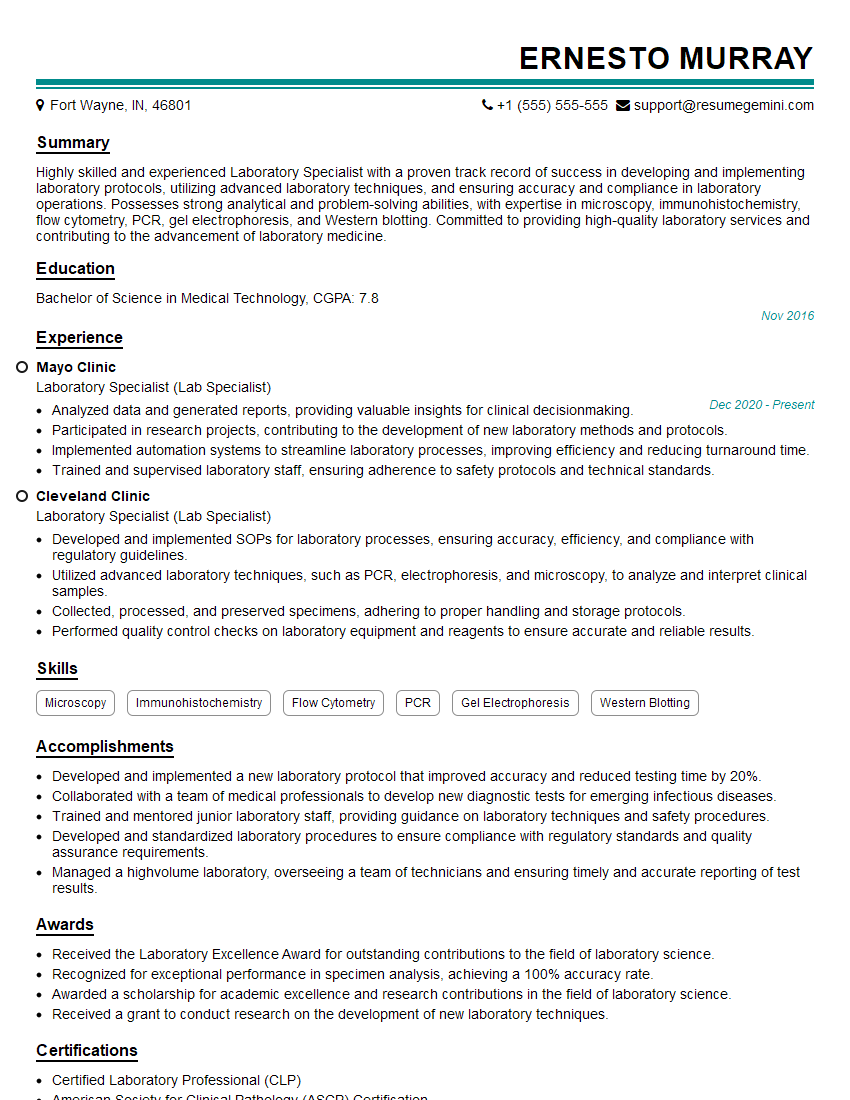Are you a seasoned Laboratory Specialist (Lab Specialist) seeking a new career path? Discover our professionally built Laboratory Specialist (Lab Specialist) Resume Template. This time-saving tool provides a solid foundation for your job search. Simply click “Edit Resume” to customize it with your unique experiences and achievements. Customize fonts and colors to match your personal style and increase your chances of landing your dream job. Explore more Resume Templates for additional options.

Ernesto Murray
Laboratory Specialist (Lab Specialist)
Summary
Highly skilled and experienced Laboratory Specialist with a proven track record of success in developing and implementing laboratory protocols, utilizing advanced laboratory techniques, and ensuring accuracy and compliance in laboratory operations. Possesses strong analytical and problem-solving abilities, with expertise in microscopy, immunohistochemistry, flow cytometry, PCR, gel electrophoresis, and Western blotting. Committed to providing high-quality laboratory services and contributing to the advancement of laboratory medicine.
Education
Bachelor of Science in Medical Technology
November 2016
Skills
- Microscopy
- Immunohistochemistry
- Flow Cytometry
- PCR
- Gel Electrophoresis
- Western Blotting
Work Experience
Laboratory Specialist (Lab Specialist)
- Analyzed data and generated reports, providing valuable insights for clinical decisionmaking.
- Participated in research projects, contributing to the development of new laboratory methods and protocols.
- Implemented automation systems to streamline laboratory processes, improving efficiency and reducing turnaround time.
- Trained and supervised laboratory staff, ensuring adherence to safety protocols and technical standards.
Laboratory Specialist (Lab Specialist)
- Developed and implemented SOPs for laboratory processes, ensuring accuracy, efficiency, and compliance with regulatory guidelines.
- Utilized advanced laboratory techniques, such as PCR, electrophoresis, and microscopy, to analyze and interpret clinical samples.
- Collected, processed, and preserved specimens, adhering to proper handling and storage protocols.
- Performed quality control checks on laboratory equipment and reagents to ensure accurate and reliable results.
Accomplishments
- Developed and implemented a new laboratory protocol that improved accuracy and reduced testing time by 20%.
- Collaborated with a team of medical professionals to develop new diagnostic tests for emerging infectious diseases.
- Trained and mentored junior laboratory staff, providing guidance on laboratory techniques and safety procedures.
- Developed and standardized laboratory procedures to ensure compliance with regulatory standards and quality assurance requirements.
- Managed a highvolume laboratory, overseeing a team of technicians and ensuring timely and accurate reporting of test results.
Awards
- Received the Laboratory Excellence Award for outstanding contributions to the field of laboratory science.
- Recognized for exceptional performance in specimen analysis, achieving a 100% accuracy rate.
- Awarded a scholarship for academic excellence and research contributions in the field of laboratory science.
- Received a grant to conduct research on the development of new laboratory techniques.
Certificates
- Certified Laboratory Professional (CLP)
- American Society for Clinical Pathology (ASCP) Certification
- College of American Pathologists (CAP) Certification
- Clinical Laboratory Scientist (CLS)
Career Expert Tips:
- Select the ideal resume template to showcase your professional experience effectively.
- Master the art of resume writing to highlight your unique qualifications and achievements.
- Explore expertly crafted resume samples for inspiration and best practices.
- Build your best resume for free this new year with ResumeGemini. Enjoy exclusive discounts on ATS optimized resume templates.
How To Write Resume For Laboratory Specialist (Lab Specialist)
- Highlight your expertise in specific laboratory techniques and technologies.
- Quantify your accomplishments whenever possible, using specific metrics and data.
- Demonstrate your commitment to quality assurance and regulatory compliance.
- Showcase your ability to work independently and as part of a team.
- Proofread your resume carefully for any errors.
Essential Experience Highlights for a Strong Laboratory Specialist (Lab Specialist) Resume
- Developed and implemented SOPs for laboratory processes, ensuring accuracy, efficiency, and compliance with regulatory guidelines.
- Utilized advanced laboratory techniques, such as PCR, electrophoresis, and microscopy, to analyze and interpret clinical samples.
- Collected, processed, and preserved specimens, adhering to proper handling and storage protocols.
- Performed quality control checks on laboratory equipment and reagents to ensure accurate and reliable results.
- Analyzed data and generated reports, providing valuable insights for clinical decision-making.
- Participated in research projects, contributing to the development of new laboratory methods and protocols.
- Trained and supervised laboratory staff, ensuring adherence to safety protocols and technical standards.
Frequently Asked Questions (FAQ’s) For Laboratory Specialist (Lab Specialist)
What are the primary responsibilities of a Laboratory Specialist?
Laboratory Specialists perform a wide range of tasks essential to the operation of a laboratory, including developing and implementing SOPs, utilizing advanced laboratory techniques, collecting and processing specimens, performing quality control checks, analyzing data, and training staff.
What qualifications are required to become a Laboratory Specialist?
To become a Laboratory Specialist, individuals typically need a Bachelor’s degree in Medical Technology or a related field, along with certification from a recognized organization, such as the American Society for Clinical Pathology (ASCP).
What are the career prospects for Laboratory Specialists?
Laboratory Specialists have various career opportunities, including working in hospitals, clinics, reference laboratories, and research institutions. They can also specialize in specific areas, such as molecular diagnostics, hematology, or microbiology.
What are the key skills required for a successful Laboratory Specialist?
Successful Laboratory Specialists possess a strong foundation in laboratory techniques, analytical and problem-solving abilities, attention to detail, and communication skills.
How can I prepare for an interview for a Laboratory Specialist position?
To prepare for an interview, research the organization and the specific position, practice answering common interview questions, and review your resume and relevant laboratory experience.
What are the ethical considerations for Laboratory Specialists?
Laboratory Specialists must adhere to ethical guidelines, including maintaining patient confidentiality, ensuring accurate and reliable results, and reporting any suspected irregularities or errors.